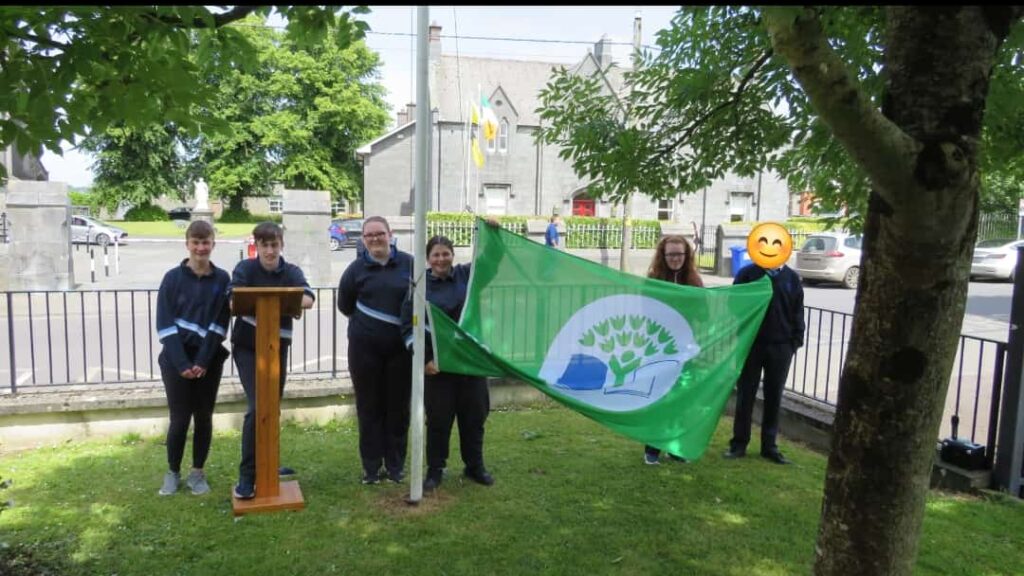Mother of Fair Love is a Special School based in Kilkenny. It is comprised of 70 students and 17 members of staff. They were awarded their first Green Flag for Litter & Waste in 2024.
Step 1: Green-Schools Committee
The Green-Schools committee includes the principal, teachers and representative from 1st, 3rd and 5th and 6th year. The committee meet fortnightly to discuss their current projects and the various ways they communicate information across the school.
Step 2: Environmental Review
The Green Schools Committee carried out all essential and recommended actions outlined in the Green-Schools Handbook. Litter blackspots were identified and mapped to ensure these areas could be monitored by the committee. Most of the schools’ blackspots were not a result of the students littering but by those passing by the school littering over the boundary fence onto the school grounds Through carrying out surveys across the school, they discovered that no classrooms had recycling bins. This prompted the committee to contact their bin company to replace some of their general waste bins for green bins.
Step 3: Action Plan
The school set out an ambitious action plan to be achieved over the two years of working on Litter & Waste. Successful actions included:
- Host Mayor Visit for a Carbon Neutral Talk
- Host a visit for our Environmental Awareness Officer, Bernadette Moloney
- Arrange less waste and more recycling bins with the bin contractor
- Waste detectives – Bin audit in classrooms and in staff rooms
- Send a survey to all classrooms and assess if they have recycling and food waste bins
- Carry out Litter Picks
- Whole school awareness of the Green Code
- Reduce school general waste by 25%
- Contact food supplier to change their packaging to 100% compostable
- Maintain Green Schools Noticeboard
- Complete Green Schools art project
- Collect 10 boxes of batteries for the WEEE battery competition
- Take part in the Team Up to Clean Up community initiative
- The committee attended an insect hotel workshop which was carried out in the library
- Check the new classrooms and ensure each room has a recycling bin
- Source two additional recycling bins for 3rd and 1st years
- Carry out litter picks on the back year to collect litter that accumulated over the summer holidays
- Create anti-litter signs to put outside the school
Step 4: Monitoring and Evaluation
Students conducted weekly litter picks around the school’s grounds, this includes checking on the schools’ litter blackspots. Weekly bin audits are carried out on Thursdays where the 5th year class collects all the recycling bins in the school, they check and record the contents of the bins. The wheelie bins are also checked on a weekly basis. With frequent Green Schools Meetings, students share their observations on where improvements are needed around the school.
Step 5: Curriculum Links
Some examples of the school’s curriculum links include:
Art
- Recycled CD fish, anti-litter signs, sustainable art project in library; birdfeeders, insect hotels, using recycled materials for projects (scrap paper Christmas door décor)
Literacy:
- Reading comprehensions e.g. The Problem with Plastic
Biology:
- Biodegrading Experiment
Geography:
- Litter Maps, Examine the global impact of waste and litter on different regions and cultures
Numeracy
- Collect and analyse data related to litter and waste in the school or community
Information Technology
- Online investigation, sending emails, manipulating data into tables/ graphs
Chemistry:
- Investigate the chemical properties of common waste items and their potential hazards
Environmental Science:
- Study the environmental consequences of improper waste disposal and the benefits of recycling and composting
PE
- Partake in litter clean-up days or outdoor activities that promote environmental awareness e.g. Nature Walk for nature tree day
6. Informing and Involving
The school informed and involved the whole school and local community in the following ways; Through their action day – Team Up to Clean Up. Mother of Fair Love students collaborated on a community clean up organised by Kilkenny County Council. The council provided the school with litter picking equipment. The 3rd year class group coordinated the event. A senior and junior class were paired to take part in the clean up together. The younger groups focused on the school grounds while the older classes worked on the adjoining lanes. The county council had a hashtag and the school submitted photos and posted on the school Facebook page and website. The students created a project on create a book to outline the event. The Green Schools Noticeboard is kept up to date and the class publish newsletters that are passed out to classes. The students often visit classes and give presentations. There is a weekly senior assembly where updates are given by the committee to the senior cycle students.
Step 7: Green Code
Students were invited to produce a slogan to be used as the Green Code. The 3rd years class suggested different works they though could be included in the Green Code.
Reduce your waste to our planet a better place
Students were asked to integrate this into their lives by first and foremost reducing the waste they produce. Students have replaced plastic water bottles with reusable flasks and cut down on the plastic/tinfoil used on packed lunches. They have tried to cut down on food wate in the Home Ec. lessons by ensuring they do not over buy and try to use what they already have. They try to buy food items loose rather than packaged. Students are asked to bring home uneaten food. They have asked all classes to keep a scrap paper basket. This paper can be used for things like notices / quizzes / art.
Testimonial:
“Students flourished from the responsibility of being involved in a group initiate and were quick to adapt to the new procedures. They enjoyed informing and motivating their peers and staff by holding them accountable for their waste. Students reported that they have changed some of their practices around waste at home. Students began making better informed decisions and have a greater sense of pride from what they have achieved to date. Students’ confidence has increased, and they became capable of making class announcements and voicing their thoughts in committee meetings. Students also enjoyed engaging with the wider local community and establishing links.”

